Paris Olympics: The best stats from the 2024 Games
Olympics 2024: Every Team GB Olympic medal in Paris
- Published
After 16 action-packed days, Paris 2024 has reached its conclusion.
It has delivered sporting drama by the bucketload, the emergence of new heroes, world records have been broken and plenty of history written.
So what are the stats to savour from this Olympic Games? BBC Sport takes a look...
Counting up the medals
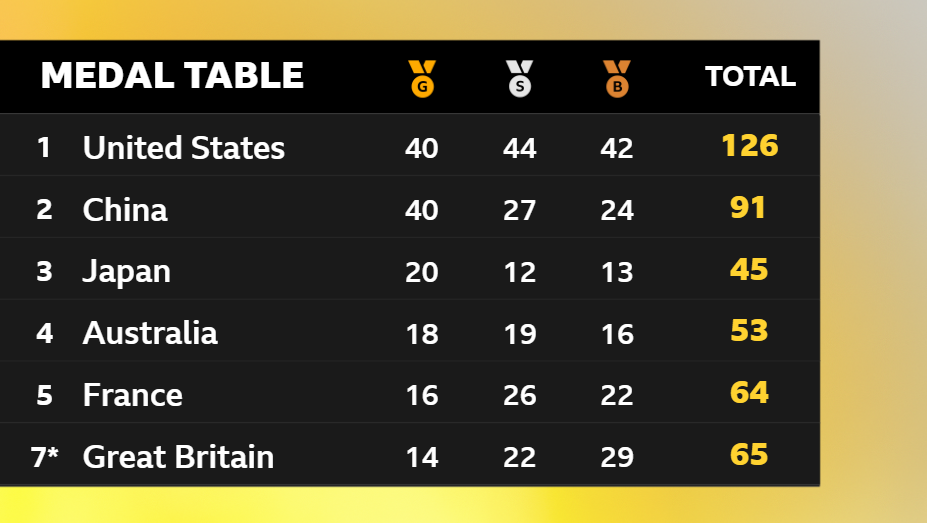
*The Netherlands were sixth with a total of 34 medals - 15 golds, seven silvers and 12 bronze
The United States top the medal table for the seventh time in eight Olympic Games. At all eight, they have won the most overall medals.
Great Britain matched their total number of medals from London 2012 as they passed the 60-medal mark for a fourth successive Olympics.
Their tally of 65 was one better than Tokyo three years ago but it proved a Games of silver linings with just 14 golds collected, their lowest since Athens in 2004.
Meanwhile, Japan followed on from their record-breaking success at their home Tokyo Games in which they won 27 golds, and excelled with another 20 golds, which is their second highest tally of all time.
Their total was buoyed by their status as powerhouses in the wrestling, where they won eight golds at the Champ de Mars Arena.
Australia's 18 golds also helped them to a fourth-placed finish as they beat their previous best total of 17 in Athens and Tokyo.
The world records that tumbled
McLaughlin-Levrone wins gold with new world record
Sydney McLaughlin-Levrone smashed her own world record as she stormed to a sensational Olympic 400m hurdles gold in a time of 50.37 seconds, while her fellow Americans Vernon Norwood, Shamier Little, Kaylyn Brown and Bryce Deadmon set a new mark in the 4x400m mixed relay.
Sweden's Armand Duplantis had already wrapped up the men's pole vault gold medal when he improved his world best of 6.24m, that he set in April, by one centimetre.
There were 31 world records broken overall, with the highest percentage (39%) arriving in the velodrome. Great Britain's Katy Marchant, Sophie Capewell and Emma Finucane were responsible for three of those on the way to gold in the women's team sprint.
That compares favourably to Tokyo where 22 world records went and is also slightly above the 27 that were eclipsed in Rio eight years ago.
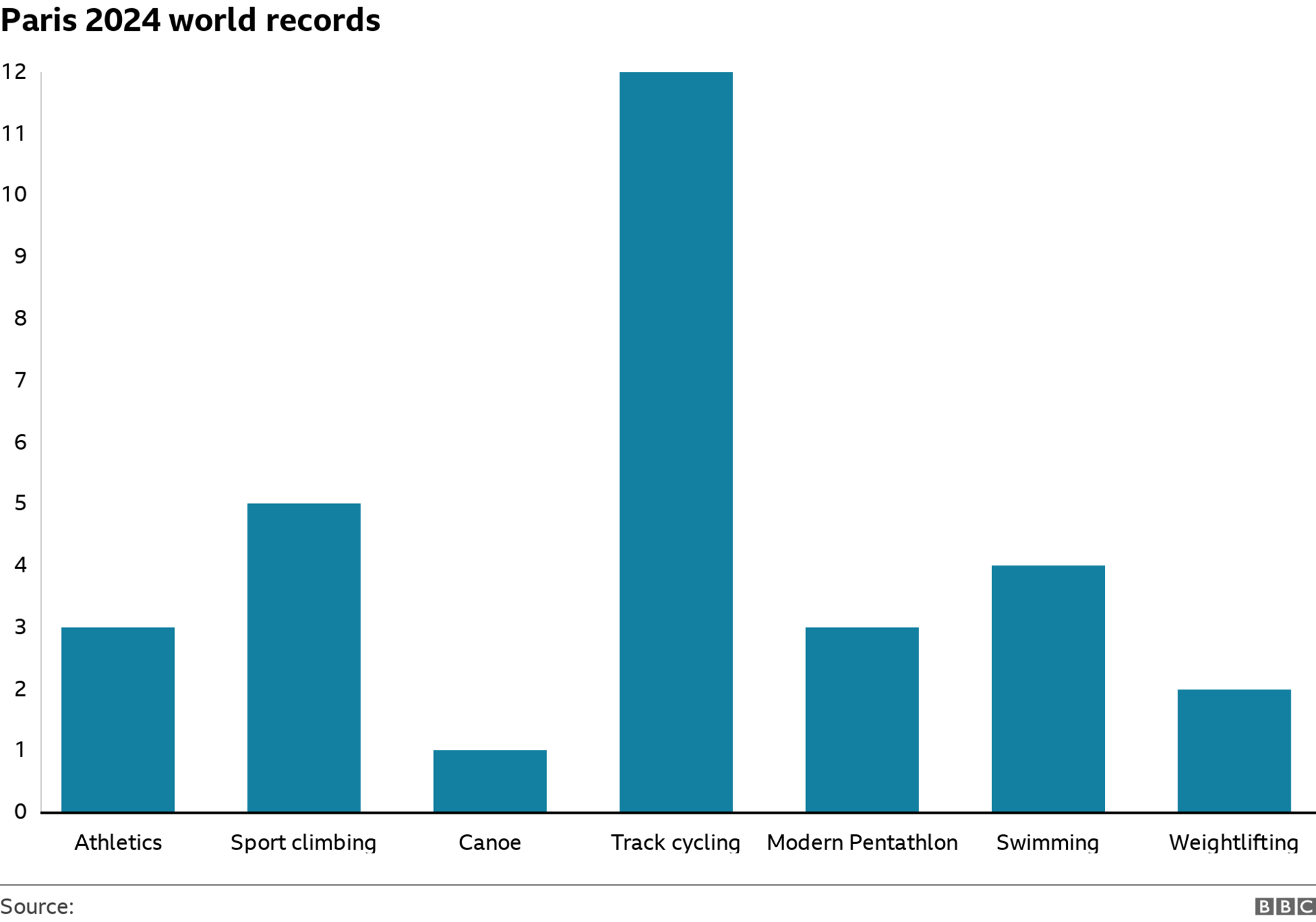
Reports have suggested the Olympic pool's relatively shallow depth of seven feet may have slowed down swimmers due to increased turbulence.
The athletes who excelled at the Games
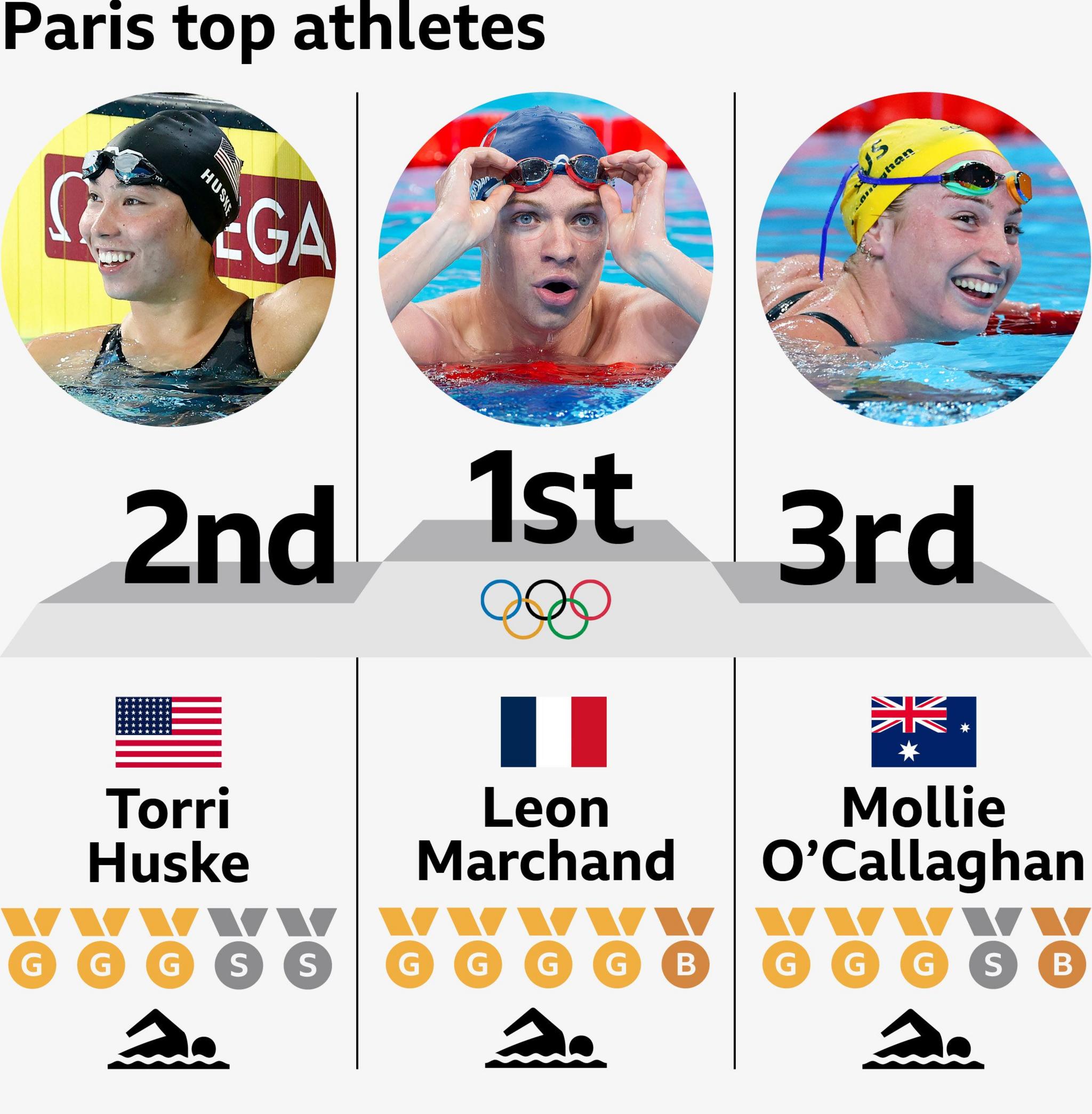
Paris 2024 saw the emergence of a new swimming superstar as Leon Marchand became the first French athlete to take four individual golds at a single summer Olympics.
The 22-year-old hogged the headlines on home soil as he became only the third male swimmer ever to achieve the feat, after American greats Michael Phelps and Mark Spitz, and he added to his medal collection in the 4x100m medley relay with a bronze.
His five medals make him the joint most decorated athlete at the Games, along with fellow swimmers Mollie O'Callaghan from Australia and Torri Huske from the US.
Away from the pool, Simone Biles was back to her brilliant best with A-listers Lady Gaga, Nicole Kidman, Natalie Portman, Spike Lee, Tom Brady and Tom Cruise's presence underlining her status as the hottest ticket in town.
Three triumphs - the all-around and vault titles, plus the team competition - took her career Olympic gold medal total to seven.
The nations exceeding expectations
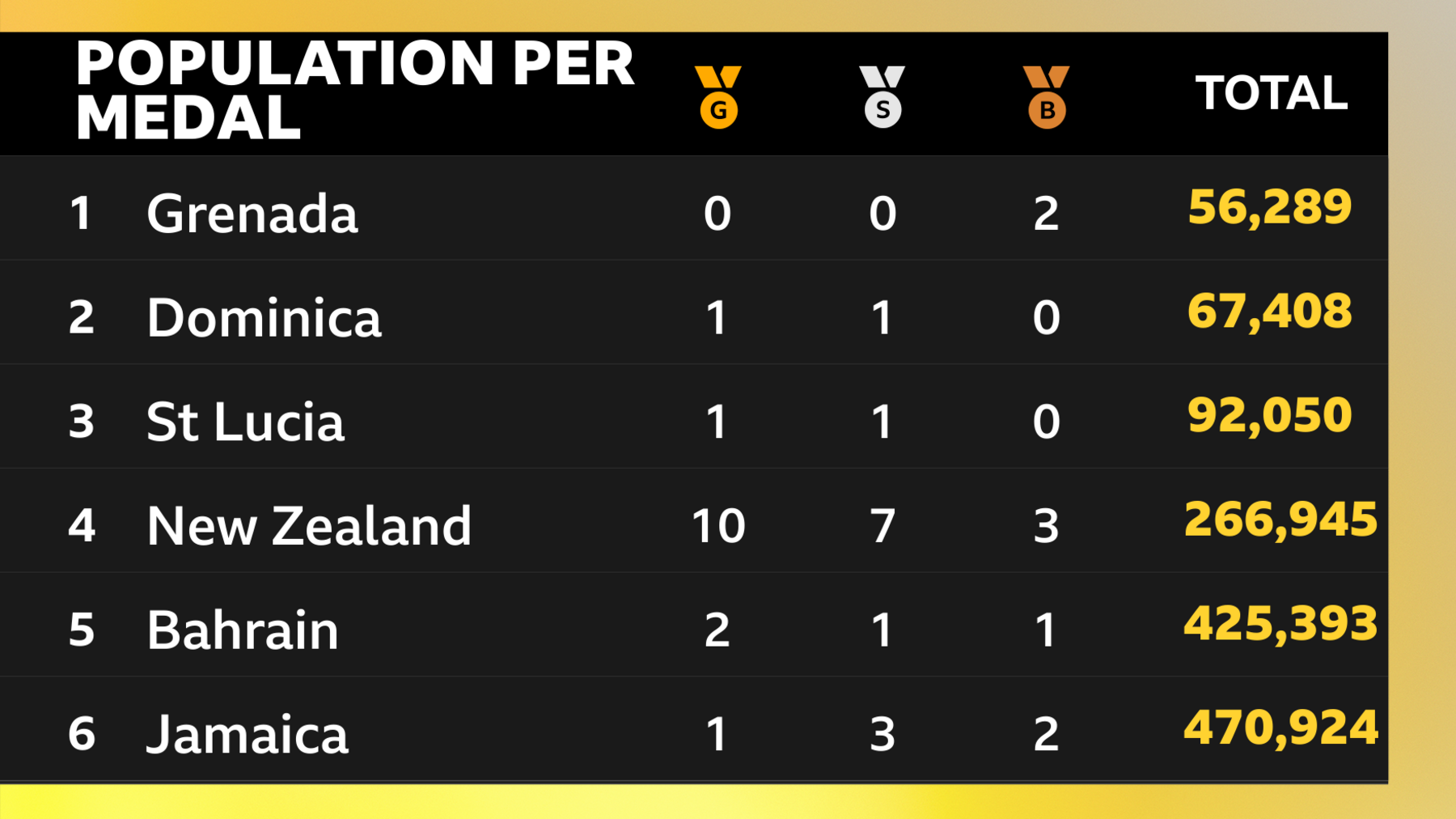
The USA finished 47th when measuring medals by a size of population measure
While the USA topped the official medals table, with population of just over 112,000, Grenada were actually the most successful nation when it comes to winning Olympics medals based on the size of their nation.
Anderson Peters and Lindon Victor's bronze medals in both the men's javelin and decathlon meant they averaged one medal per 56,289 inhabitants.
Dominica, Saint Lucia and New Zealand, who averaged one medal per 266,945 of their population, make up the top four.
Meanwhile Ireland were 18th, with Great Britain in 24th, the USA in 47th and China in 74th, while medal-starved India were bottom of the table averaging one medal per 234,151,666.
India sent a contingent of 117 athletes to Paris, yet had a meagre haul of five bronze medals and a solitary silver to show for their efforts. They were also one of 28 teams that failed to win a gold in any sport.
How did Individual Neutral Athletes (AIN) fare?
One of the big changes in the medal table was the absence of Russia, who have historically always been among the top four medal-winning countries and among the largest contingents.
But the country was banned from these Games following the Russian invasion of Ukraine, with its ally Belarus also barred. Instead, a handful of athletes from the countries (15 from Russia, 17 from Belarus) were invited to compete as Individual Neutral Athletes (AIN) without national flags or anthems.
They had to meet strict criteria over their eligibility - they had to pass background checks to make sure they did not actively support the war and were not contracted to the Russian or Belarusian military or national security agencies.
Medals were won in five events by AINs but these are not being counted in the official medal table. Just one medal ceremony featured the specially composed anthem for AIN gold-medal winners.
Belarusians won medals in two trampoline events (Ivan Litvinovich - men's gold, Viyaleta Bardzilouskaya - women's silver), one in rowing (Yauheni Zalaty - silver) and one in weightlifting (Yauheni Tsikhantsou - bronze).
The only medal won by Russians was a silver for tennis players Mirra Andreeva and Diana Shnaider in the women's doubles.
Was Lyles' 100m gold the closest of the Games?
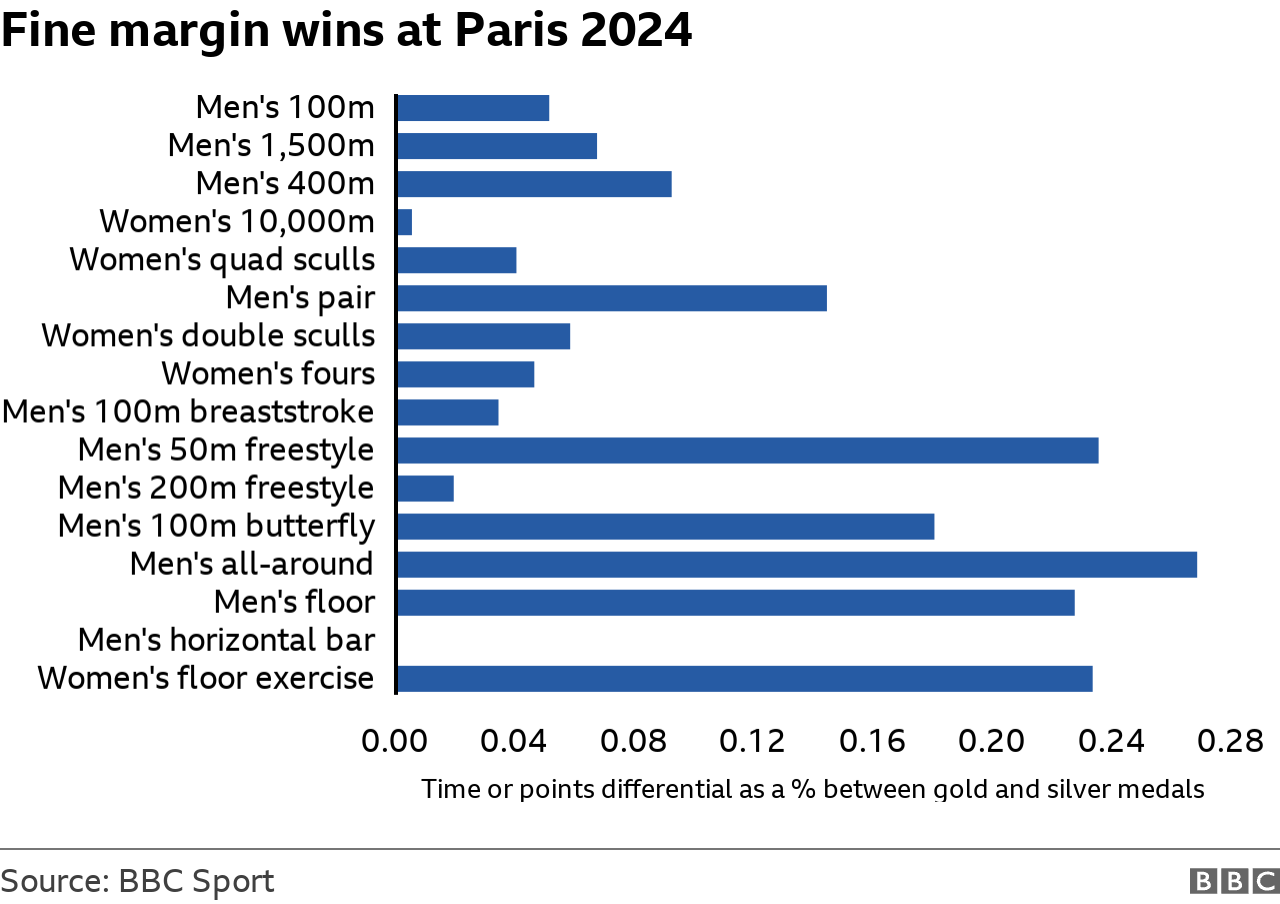
At all Olympic Games, medals are decided by the finest of margins.
That has been particularly true in Paris with Noah Lyles claiming a stunning 100m gold by virtue of thrusting his torso out over the line first.
However, in terms of winning margin (either in terms of times/points) that was not the smallest when worked out as a percentage of the winning time or points total.
It wasn’t even the closest on the track, with the women’s 10,000m, won by Kenya’s Beatrice Chebet, closer at just 0.005% of the overall time.
Great Britain’s photo-finish win over the Netherlands in the women’s quadruple sculls rowing was by a finer margin too, as were Adam Peaty and Matt Richards’ silvers in the pool.
However, the closest of them all was the men’s horizontal bar gymnastics final, where Japan’s Shinnosuke Oka and Colombia’s Angel Barajas were barely inseparable. They both scored exactly 14.533 but the former won because of a higher execution score.
Where did GB's medals arrive from?
Hodgkinson wins gold in women's 800m
Keely Hodgkinson's superb 800m gold was one of the moments of the Games for Team GB, whose 10 medals on the track was their best tally at an Olympics since 1984 when they won 16 including golds for Sebastian Coe, Daley Thompson and Tessa Sanderson.
Alex Yee produced a sensational sprint finish to top the podium in the men's triathlon and trampoline gold for Bryony Page crowned two decades of commitment to her craft, while Ellie Aldridge delivered an exhilarating kitesurfing success.
Lewis Richardson ensured the British boxing team did not walk away empty handed by earning a bronze after all five of his teammates were beaten in their first bouts.
Tom Pidcock also defied a puncture to retain his Olympic mountain bike title as GB claimed medals in 19 different sports.
Of Team GB's 14 gold medals, six each came in men's and women's events and two in mixed equestrian events, where male and female riders compete together - although the team jumping was won by an all-male trio of Scott Brash, Harry Charles and Ben Maher.